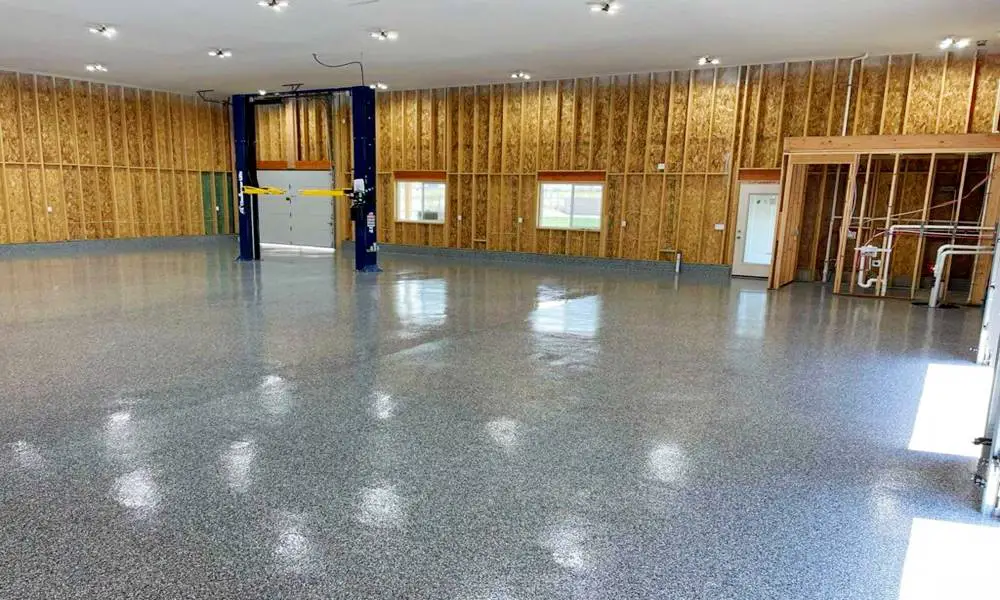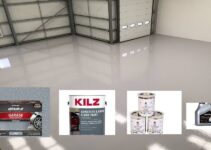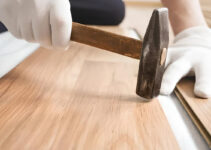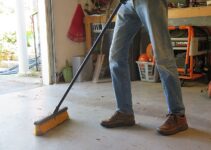Cost to Epoxy a Garage Floor

Are you considering transforming your garage floor with epoxy coating? It’s essential to understand the cost associated with this popular flooring option. In this article, I will explore the pricing of epoxy garage flooring, factors that can affect the cost, and how to get a quote for your project.
When it comes to epoxy garage floor cost, there are several factors to consider. The average pricing can vary based on the size of your garage, the condition of the existing floor, and the types of enhancements you choose. Additionally, whether you opt for a DIY installation or hire a professional can impact the overall cost.
If you’re wondering how much it will cost to epoxy your garage floor, this article has got you covered. I will guide you through the factors that can influence the price, such as surface preparation and additional features. Whether you’re on a tight budget or looking to invest in a high-end epoxy coating, understanding the cost will help you plan effectively.
Let’s dive into the details and discover the average pricing, factors affecting the cost, and how to determine the size of your garage floor. By the end of this article, you’ll have a clear idea of the epoxy garage flooring cost and be well-equipped to make an informed decision.
Factors Affecting Epoxy Garage Floor Cost
The cost of epoxy garage flooring can vary based on several factors. To understand how these factors impact the overall cost, let’s take a closer look:
Floor Condition
The condition of your garage floor plays a significant role in determining the cost. If your floor is in good condition and requires minimal repairs or preparation, the cost can be relatively lower. However, if your floor has cracks, unevenness, or previous coatings that need to be removed, additional work and expenses may be required.
Surface Preparation
Proper surface preparation is crucial for a successful epoxy garage floor installation. Factors like cleaning, repairing cracks or damages, and acid etching can affect the overall cost. In some cases, extensive surface preparation may be necessary, increasing the overall project cost.
Additional Features
Adding extra features to your epoxy garage floor, such as decorative flakes or anti-slip additives, can enhance its appearance and functionality. However, these additional features may come with added costs. The price may vary depending on the type and quality of the enhancements you choose.
Professional Installation
While DIY epoxy application may seem cost-effective, hiring a professional for installation can ensure a high-quality and long-lasting result. Professional contractors have the expertise and equipment to deliver excellent work. However, professional installation typically comes at a higher cost compared to DIY projects.
To give you a better understanding of the average cost involved, here’s a breakdown of the average cost of epoxy garage flooring per square foot:
| Epoxy Garage Flooring Type | Average Cost per Square Foot |
|---|---|
| Solid Color Epoxy | $3 – $7 |
| Epoxy with Decorative Flakes | $4 – $8 |
| Metallic Epoxy | $6 – $12 |
These prices may vary depending on your location, the complexity of the project, and the contractor you choose.
In the next section, we will discuss the cost comparison between DIY epoxy floor installation and hiring a professional contractor.
DIY vs Professional Epoxy Floor Installation Cost
When it comes to epoxy garage floor installation, many homeowners weigh the option of doing it themselves or hiring a professional contractor. One of the main factors influencing this decision is cost. In this section, we will compare the cost of undertaking a DIY epoxy application versus the expense of hiring a professional.
The Cost of DIY Epoxy Floor Installation
DIY epoxy floor installation typically offers a lower upfront cost compared to hiring a professional. The expenses primarily include the cost of epoxy materials, tools, and any additional products required for surface preparation. By taking on the project yourself, you can avoid labor charges associated with professional services.
However, it’s important to consider that DIY epoxy application requires a certain level of skill and expertise. If not done correctly, it can lead to costly mistakes and unsatisfactory results. Additionally, the time and effort required for proper surface preparation, application, and curing should be taken into account.
The Benefits of Hiring a Professional
While professional epoxy floor installation comes with a higher price tag, it offers several advantages that may outweigh the cost. Professionals have the necessary knowledge, experience, and tools to ensure a flawless installation. They understand the intricacies of surface preparation and can address any underlying issues that may affect the success of the epoxy coating.
Furthermore, professional contractors often provide warranties or guarantees on their workmanship, giving you peace of mind and added protection. They will also be able to offer expert advice on the best epoxy products for your specific needs and preferences.
Factors to Consider
When deciding between DIY and professional epoxy floor installation, consider the following factors:
- Your skill level and experience with DIY projects
- The complexity of your garage floor condition
- The amount of time and effort you can dedicate to the project
- The desired quality and longevity of the epoxy coating
By weighing these factors alongside the cost, you can make an informed decision that aligns with your budget and project goals.
Epoxy Garage Flooring Options and Pricing
When it comes to epoxy garage flooring, there are various options to choose from, each with its own pricing structure. Whether you prefer a simple solid color epoxy or want to add decorative flakes or metallic finishes, there’s an option that suits your budget and aesthetic preferences.
Solid Color Epoxy
One of the most popular options for epoxy garage flooring is solid color epoxy. This type of epoxy coating comes in a variety of colors, allowing you to choose the one that best matches your garage décor. Solid color epoxy is not only durable but also easy to clean, making it a practical choice for any garage. The cost for solid color epoxy typically ranges from $3 to $7 per square foot.
Decorative Flakes
For a more textured and visually appealing finish, you can opt for epoxy garage flooring with decorative flakes. These flakes come in various colors and sizes, allowing you to create a custom look for your garage. Decorative flakes not only add beauty to your floor but also provide additional traction, making it safer to walk on. The cost for epoxy flooring with decorative flakes typically ranges from $4 to $9 per square foot.
Metallic Finishes
If you want to make a bold statement with your garage floor, metallic finishes are a great option. Metallic epoxy coatings create a unique and stunning look, with a glossy finish that reflects light and adds depth to your garage. The cost for metallic epoxy finishes can range from $7 to $12 per square foot, depending on the complexity of the design and the number of coats required.
It’s important to note that these pricing ranges are approximate and can vary depending on factors such as the size of your garage, the condition of the floor, and the location. To get an accurate cost estimate for your epoxy garage flooring project, it’s recommended to consult with a professional contractor who can assess your specific needs and provide a detailed quote.
Determining the Size of Your Garage Floor
To estimate the cost of your epoxy garage floor project, it’s crucial to determine the size of your garage floor. By accurately measuring the area, you can calculate the square footage and get an accurate cost estimate. Here’s how:
- Clean the garage: Clear out any items and debris from your garage to get a better view of the floor.
- Measure the length and width: Use a tape measure to measure the length and width of your garage floor. Make sure to measure from wall to wall, taking into account any alcoves or irregular shapes.
- Calculate the square footage: Multiply the length by the width to get the total square footage of your garage floor. For example, if your garage floor is 20 feet long and 15 feet wide, the total square footage would be 300 square feet.
Once you have determined the size of your garage floor, you can use this information to get accurate quotes from contractors and calculate the average cost of epoxy garage flooring. Keep in mind that the cost may vary based on additional factors such as floor condition and surface preparation.
Preparing Your Garage Floor for Epoxy Coating
When it comes to installing epoxy coatings on your garage floor, proper surface preparation is key to achieving a successful and long-lasting result. In this section, I will guide you through the necessary steps to prepare your garage floor for epoxy coating, ensuring optimal adhesion and durability.
Cleaning
The first step in preparing your garage floor is thorough cleaning. Remove any debris, stains, or existing coatings from the surface. Sweep or vacuum the floor to remove loose dirt and dust. Then, use a degreaser or detergent along with a scrub brush or pressure washer to clean the floor effectively. Rinse the floor thoroughly to eliminate any soap residue.
Repairs
Inspect your garage floor for any cracks, chips, or areas of damage. It’s essential to repair these issues before applying the epoxy coating. Use a concrete patching compound or epoxy filler to fill in any cracks or holes. Smooth out the repaired areas and allow them to dry completely according to the manufacturer’s instructions.
Etching
Etching the garage floor is a crucial step in ensuring proper adhesion of the epoxy coating. Etching involves creating a slightly rough surface that allows the epoxy to bond effectively with the concrete. There are different methods for etching, including acid etching and mechanical etching. Follow the instructions provided by the epoxy coating manufacturer for the recommended etching method and materials.
Cost Implications
Surface preparation for epoxy coating can have cost implications, especially if you opt for professional installation. Hiring a professional contractor to prepare your garage floor can save you time and effort, but it may come at an additional cost.
The cost of professional floor preparation will depend on the size and condition of your garage floor, as well as the specific surface preparation techniques required. It’s best to consult with a professional to get an accurate cost estimate for surface preparation.
| Surface Preparation Methods | Cost |
|---|---|
| Cleaning and basic repairs | $100 – $500 |
| Etching | $0.20 – $0.50 per square foot |
| Hiring a professional for surface preparation | Additional $1 – $3 per square foot |
Keep in mind that proper surface preparation is essential for achieving the best results with your epoxy garage floor coating. While it may add to the overall cost of your project, it ensures a long-lasting and visually appealing finish.
Additional Features and Enhancements
Enhancing the look and functionality of your epoxy garage floor is possible with a variety of additional features and enhancements. These options allow you to customize your floor to meet your specific needs and aesthetic preferences. However, it’s important to consider that these enhancements can impact the overall cost of your project. Let’s explore some popular options:
Decorative Flakes
Decorative flakes are a popular choice for adding a touch of visual interest to your epoxy garage floor. These flakes come in various colors and sizes, allowing you to create a unique and eye-catching design. They can be applied in a light coverage for a subtle effect or a heavier coverage for a more vibrant look. The cost of decorative flakes depends on the quantity and quality of the flakes used.
Anti-Slip Additives
Ensuring the safety of your garage floor is crucial, especially when it comes to preventing slips and falls. To enhance the traction of your epoxy floor, you can incorporate anti-slip additives. These additives are mixed into the epoxy coating, providing a textured surface that reduces the risk of accidents. The cost of anti-slip additives is typically affordable and can vary based on the type and amount used.
Custom Designs
If you’re looking for a truly unique and personalized garage floor, consider opting for a custom design. Whether you want to include your favorite sports team’s logo or create a one-of-a-kind pattern, a professional installer can bring your vision to life. Custom designs require additional time and expertise, which can affect the overall cost of your epoxy floor project. The price of custom designs varies depending on the complexity and size of the design.
When considering these additional features and enhancements, it’s important to discuss your ideas and requirements with a professional installer. They can provide guidance on the best options for your garage floor and provide accurate pricing information. Remember to factor in the cost of these enhancements when budgeting for your epoxy garage floor project.
DIY Epoxy Garage Floor Cost Breakdown
If you’ve decided to take on the challenge of epoxy garage floor installation yourself, it’s important to have a clear understanding of the cost breakdown. By breaking down the average cost per square foot for DIY epoxy projects, you can better plan and budget for your project.
Cost of Materials
The primary cost associated with a DIY epoxy garage floor project is the materials. These include the epoxy coating, primer, and any additional products needed for surface preparation and finishing touches. The cost of materials can vary depending on the brand, quality, and quantity needed for your specific garage floor size.
Tools and Equipment
Another expense to consider is the tools and equipment required for the epoxy garage floor installation. These may include items such as a concrete grinder or shot blaster for surface preparation, a paint roller or squeegee for applying the epoxy coating, and other tools for mixing and cleaning. The cost of these tools can vary depending on whether you choose to purchase or rent them.
Additional Expenses
In addition to materials and tools, there may be some additional expenses to consider. These could include any necessary repairs to the garage floor, the cost of cleaning solutions or chemicals, and any protective gear or clothing needed during the installation process.
While DIY epoxy garage floor installation can save you money compared to hiring a professional, it’s essential to carefully consider the cost breakdown to ensure you have the necessary resources and budget in place.
Hiring a Professional for Epoxy Floor Installation
When it comes to epoxy floor installation, hiring a professional contractor can save you time and ensure a high-quality result. While the cost of professional installation may be higher than a DIY project, there are several factors to consider that make it a worthwhile investment.
Benefits of Professional Installation
- Expertise: Professional contractors have the knowledge and experience to properly prepare your garage floor and apply the epoxy coating.
- Quality Materials: Professionals use high-quality epoxy products that offer durability and longevity.
- Efficiency: Hiring a professional saves you time and effort, as they have the necessary equipment and can complete the project quickly.
- Warranty: Many professional installations come with a warranty, providing you with peace of mind and protection.
The Average Cost of Hiring a Professional
The cost of hiring a professional for epoxy floor installation can vary depending on factors such as the size of your garage floor, the condition of the existing floor, and any additional features you choose. On average, you can expect to pay around $8 to $12 per square foot for professional epoxy floor installation.
| Factors | Average Cost Range (per square foot) |
|---|---|
| Size of Garage Floor | $8 – $12 |
| Condition of Existing Floor | Additional $2 – $4 |
| Additional Features (e.g., decorative flakes, anti-slip additives) | Varies, depending on the option chosen |
Note: The costs mentioned above are approximate and may vary depending on your location and specific project requirements.
Factors Affecting the Price
The actual price of professional epoxy floor installation can be influenced by several factors:
- Size of the garage floor: Larger floors will naturally cost more to cover with epoxy.
- Condition of the existing floor: If the floor requires extensive repairs or preparation work, it may increase the overall cost.
- Type of epoxy chosen: Different epoxy options, such as solid color or decorative flakes, can have varying price ranges.
- Additional features: Adding enhancements like anti-slip additives or custom designs can impact the total cost.
It’s essential to consult with a professional contractor to get an accurate cost estimate for your specific project as labor rates and material prices may vary.
Budgeting and Planning for Your Epoxy Garage Floor
When embarking on an epoxy garage floor project, careful budgeting and planning are key to ensuring a successful and cost-effective endeavor. By estimating costs, obtaining quotes from contractors, and creating a comprehensive budget that accounts for all necessary expenses, you can stay within your desired budget and achieve the garage floor of your dreams.
Estimating Costs
Before diving into your epoxy garage floor project, it’s crucial to have a clear understanding of the costs involved. Start by researching average garage floor epoxy pricing in your area and compare quotes from different contractors. Keep in mind that the price may vary based on factors such as the size of your garage floor, the type of epoxy coating, and any additional features or enhancements you choose.
Getting Quotes from Contractors
To get an accurate cost estimate, reach out to reputable contractors specializing in epoxy garage floor installations. Provide them with details about your project, including the size of your garage floor and any specific requirements or preferences you have. By obtaining multiple quotes, you can compare prices and services to make an informed decision.
Creating a Comprehensive Budget
Once you have estimated your costs and gathered quotes, it’s time to create a comprehensive budget that takes all expenses into account. Beyond the cost of the epoxy coating and professional installation (if applicable), consider other factors such as surface preparation, additional features like decorative flakes or custom designs, and any necessary repairs or cleaning that may be required before the epoxy application.
Here’s an example of how your budget breakdown could look:
| Description | Estimated Cost |
|---|---|
| Epoxy Coating | (depends on quality, $3-$12 per square foot) |
| Surface Preparation | (depends on size and condition, $1.50-$5 per square foot) |
| Additional Features | (optional, $1-$3 per square foot) |
| Repairs and Cleaning | (depends on severity of damage) |
| Professional Installation (if applicable) | ($40-$150 per hour) |
| Total Estimated Cost | (typically $1,000-$3,200 for professional installation) |
This budget breakdown will help you track your expenses and ensure that you allocate sufficient funds for each aspect of the project. Be sure to factor in any contingency funds in case of unforeseen expenses.
By budgeting and planning carefully, you can embark on your epoxy garage floor project with confidence, knowing that you are prepared both financially and logistically. With a well-thought-out budget in place, you can enjoy the benefits of a beautiful and durable epoxy garage floor without breaking the bank.
Tips for Saving Money on Epoxy Garage Flooring
Looking to save money on your epoxy garage flooring project? Here are some valuable tips and strategies to help lower the overall cost, from installation to maintenance:
1. Do It Yourself (DIY) Installation
If you’re handy and have the time, consider tackling the epoxy garage floor installation yourself. DIY installation can help you save significantly on labor costs. Just make sure to follow proper surface preparation guidelines and use high-quality epoxy products for lasting results.
2. Compare Prices from Multiple Suppliers
Before purchasing epoxy materials, take the time to research and compare prices from different suppliers. Look for discounts or promotions that may be available and choose the option that offers the best value for money. Keep in mind that quality should be a priority to ensure a durable and long-lasting garage floor coating.
3. Opt for Mid-Range Epoxy Coatings
While premium epoxy coatings may offer additional features and enhanced durability, they can also come with a higher price tag. Consider opting for mid-range epoxy coatings that offer a good balance between affordability and quality. These coatings can still provide excellent protection and aesthetics for your garage floor.
4. Plan Ahead for Special Offers or Sales
Keep an eye out for special offers or sales from epoxy suppliers or contractors. Many companies run promotions or discounts during specific times of the year. Planning your project accordingly and taking advantage of these offers can help you save on the overall cost of your epoxy garage flooring.
5. Proper Maintenance for Longevity
Maintaining your epoxy garage floor properly can save you money in the long run. Follow the manufacturer’s guidelines for cleaning and maintenance to prevent any damage or premature wear. Regularly sweeping or vacuuming the floor and promptly cleaning up any spills or stains can help extend the lifespan of your epoxy coating, reducing the need for expensive repairs or reapplications.
6. Seek Professional Advice
If you’re unsure about the best ways to save money on your epoxy garage flooring project, consider seeking advice from professionals. They can provide valuable insights and recommendations based on their experience. Additionally, professional installation can ensure a high-quality finish and minimize the risk of costly mistakes.
| Tip | Description |
|---|---|
| DIY Installation | Save on labor costs by installing the epoxy garage floor yourself. |
| Compare Prices | Research and compare prices from different epoxy suppliers to find the best deal. |
| Opt for Mid-Range Coatings | Choose mid-range epoxy coatings that offer a balance between affordability and quality. |
| Plan for Special Offers | Keep an eye out for special offers or sales to save on epoxy materials or installation services. |
| Proper Maintenance | Maintain your epoxy garage floor properly to extend its lifespan and avoid costly repairs. |
| Seek Professional Advice | Consult with professionals for expert advice on saving money and achieving the best results. |
Conclusion
Understanding the cost of epoxy garage flooring is crucial for planning and budgeting your project. The cost to epoxy a garage floor can vary depending on several factors such as surface preparation, additional features, DIY vs professional installation, and the size of your garage floor.
By properly preparing your garage floor and considering any additional features or enhancements you desire, you can ensure a successful and long-lasting epoxy installation. It’s important to note that while DIY epoxy installation may save you money upfront, hiring a professional can provide a higher quality finish and potentially save you money in the long run.
If you’re unsure about the cost or the best approach for your epoxy garage flooring project, don’t hesitate to get quotes from professionals. They can provide you with an accurate cost estimate based on your specific requirements and offer expert advice to guide you through the process.
Remember, investing in a high-quality epoxy garage floor can not only enhance the appearance of your garage but also increase its durability and functionality. So, take the time to weigh the cost factors, consider your options, and make an informed decision to create a beautiful and long-lasting garage floor that fits your budget.


